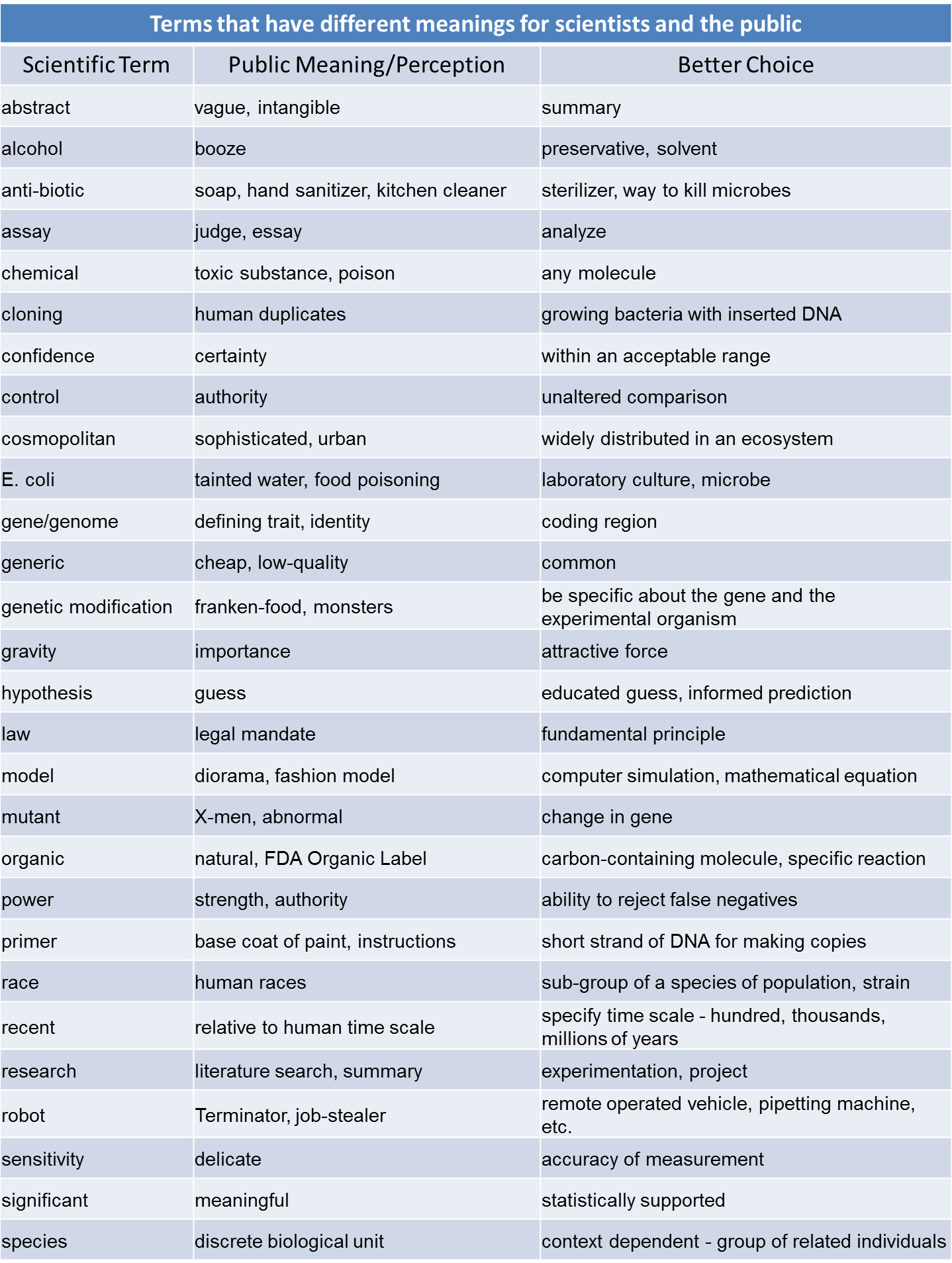 If you haven’t seen the excellent post on Mountain Beltway – Words matter – you should head over there and take a look. The post brought up some interesting ideas about word choice, and how the common definition of a word may convey a different meaning than the scientific definition. For science communicators, this may lead to confusion and misunderstanding between you and your audience.
If you haven’t seen the excellent post on Mountain Beltway – Words matter – you should head over there and take a look. The post brought up some interesting ideas about word choice, and how the common definition of a word may convey a different meaning than the scientific definition. For science communicators, this may lead to confusion and misunderstanding between you and your audience.
I presented this table to my Science and Nature Writing class this morning and asked my students to come up with other terms that may also have multiple, opposing meanings. This impressive list is what they produced:
There are obviously hundreds, if not thousands of other terms that could fit this list. So, in the spirit of collaboration and crowdsourcing, I’ve created a public Google Docs spreadsheet as a repository of confusing scientific terms. Feel free to add as you see fit, but do not delete anything. Feel free to add additional “Better Choices”. Please stick to words that clearly have multiple meanings, and not just difficult scientific concepts.
The editable spreadsheet is here – Terms that have different meanings for scientists and the public
Update: read the original paper that started this all: “Communicating the science of climate change“


This sort of thing could make a useful environmental wiktionary.
You are stupid!!! The words which are being used in science are used for their correct meaning. Spoken language is diff from written one. It is spoken language that has diversion of meaning. Also, you do have polymorphism in spoken language like, running nose, running business, running out of money and so on. and people have no prob with that. If you have decided not to understand science no one can explain you. And it is not responsibility of scientists but there are people called science journalist, like me. We have responsibility to explain science to common people.
Not sure I *entirely* agree with some of those descriptions, on both common usage and scientific usage. I wouldnt have said anything, but then again this whole discussion is about semantics, so it seems worth a comment! For example, the common usage given for “antibiotic” is closer in meaning to the common usage of “antiseptic”, but I think most folks do understand the difference between these two: hand sanitizer and a course of penicillin. Besides, the suggested alternative of “sterilizer” is even less accurate. Steam is a sterilizer, but it is certainly not an antibiotic. Secondly, “E. coli” can be and is used in a scientific context to mean tainted water/food; not everyone in science uses E. coli for genetics/cloning. Indeed, the whole reason the public uses it to mean tainted food/water is that that’s how scientists measure fecal contamination. In other words, the public took the common word usage from scientists in the first place. Finally, the suggested alternative for “sensitivity” is not correct. Sensitive tests have a low false negative rate, which is not to do with accuracy, at least not in the scientific meaning of the word “accurate”, which is about how close a test result is to the actual value. Maybe the best thing to do is add “accurate” (and while you’re at it, “specific”) to this list!
This is a fascinating topic; I’ll be interested to see how your list develops
Yeah, some of the better choices definitely need work.
Under “anti-biotic”, do NOT substitute “sterilizer”. It means something completely different. “Way to kill microbes” is a vague yet somewhat-accurate term, tho.
“fat” and “protein” might be good additions, as well. people usually associate those with “blubber” and “meat”.
Many spreadsheet writers are completely missing the point; inserting rigorous but long-winded definitions in the column for “how to speak to the public”.
Much as most of us (I would guess) are trained for rigor, it is the enemy of simplicity and clarity here.
I agree, however we are actively curating, and as terms are added we will be better able to collectively brainstorm better choices. Getting the ambiguous terms up is an important first step, even if you don’t have a great “better choice” yet.
The big, big hangup with the public is the word theory. To the general public it means a guess. Heck, to politicians and the media it seems to mean guess. To scientists it means a framework for organizing data. No one can clear this up for most people in the public. Love your list. Good luck with it.
If you want to see the original source of this table, you should read “Communicating the Science Climate Change,” published in Physics Today by Susan Hassol and Richard Somerville, both of Climate Communication. The full pdf of the piece, including the table of terms, is available for download at the Climate Communication website: http://climatecommunication.org/news/physics-today-article/
Migh tbe interesting to consider setting up something like a Science Misconceptions Wiki. (Some things are already on RationalWiki, but it would be good to educate the masses more comprehensively, specifically aiming to disabuse people of the wrongful interpretations of scientific terminology. Get them to stop saying things like “evolution is just a theory” and “crystal healing energy”, etc.)
So, I see you made a table, then took a screenshot of it and uploaded that. No alt text either. Are you too good for the tag, or do you just hate blind people?
That should be <table> tag.
The entire table, in glorious table form, is available at the link.
It’s a good idea, but this list is specifically aimed not at “misconceptions” but at words that legitimately have multiple, non-overlapping meanings depending on the context of their use.
Putting “Species” on there is a fools errand. Even scientists can’t agree on what makes a species!
Salt. Public: “table salt”. Scientists: “any compound formed by the reaction of an acid and a base”
Base. Public: “a baseball marker,” “an outpost”, “reliable political support”. Scientists: “opposite of acids, has a pH over 7”
Rich. Public “wealthy,” “flavorful”. Scientists: “abundant [in]”
Crystal. Public: “jewel-like hunk of rock, usually in the quartz family”, or “fancy glass”. Scientists: “a substance that has formed a patterned molecular structure as it solidified”
Radiation. Public: “death rays, invisible poison”. Scientists: “energy emitted”.
Efficiency. Public: “how fast something works” Scientists: “how little heat energy is wasted”
Nice. I plan to steal from it early and often. But one quibble: public answer to “assay” is WTF? It’s not a word ordinary folks use at all.